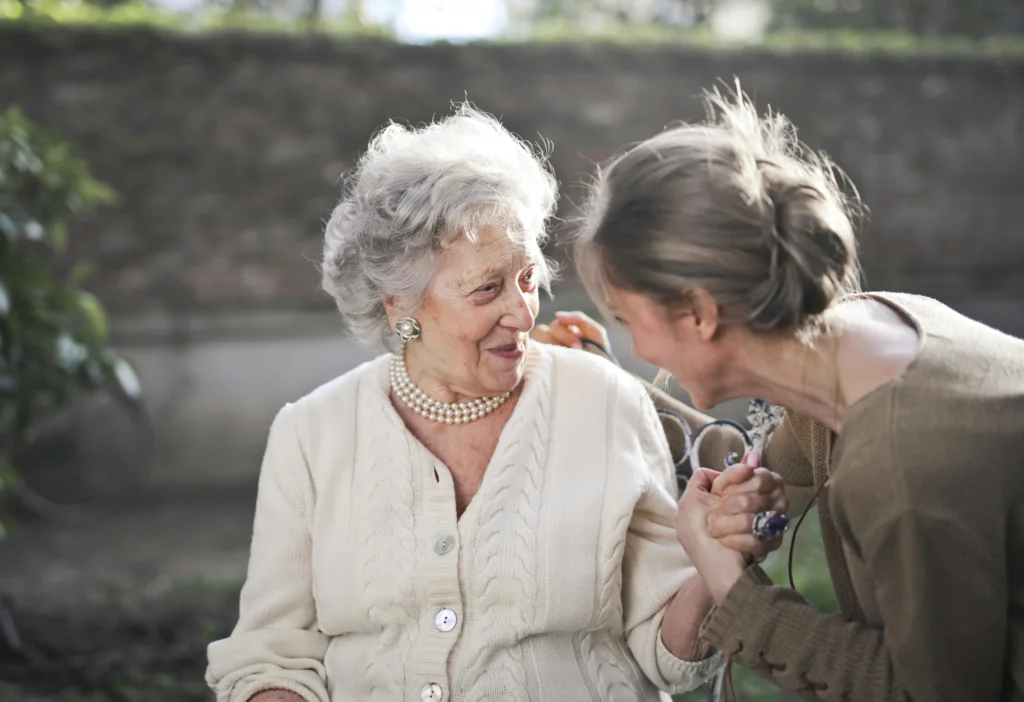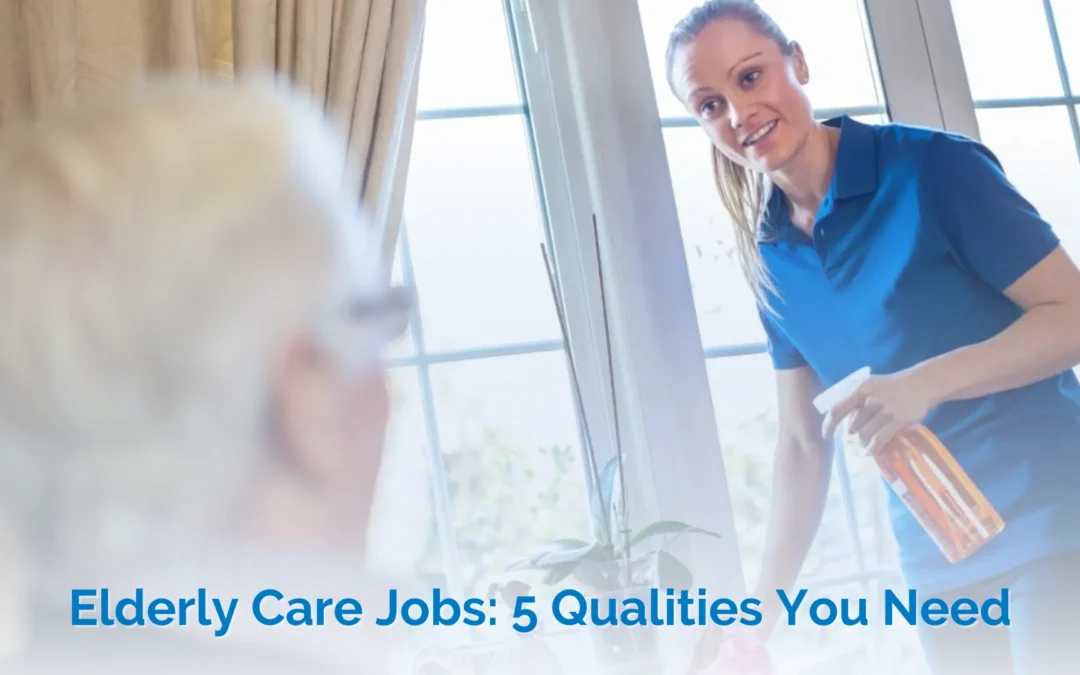As our population ages, the demand for compassionate and skilled caregivers rises, making it one of the five reasons to become one in 2024. However, understanding the essential qualities needed for elderly care is vital for success in this growing field, regardless of whether you’re new to the field or thinking about a career change. The right skills are crucial, but just as important are the personal qualities that make a caregiver truly exceptional.
In this article, we’ll explore five essential qualities for thriving in elderly care jobs.
1. Compassion
Compassion is the cornerstone of caregiving, especially in elderly care jobs. As a good caregiver, you need to stop and think for a second about how difficult it is to have your life declining as you age—how it feels to lose independence, struggle with health issues, and sometimes feel forgotten or overlooked.
Putting yourself in the shoes of the elderly you care for can deepen your empathy and guide your actions, ensuring that you provide physical assistance, emotional support, and companionship. By taking a moment to consider their perspective, you can impact their lives and offer the compassion and understanding they deserve.
Before getting into the field of elderly care jobs, you need to remember that caregiving isn’t all sunshine and rainbows. Even the most patient individuals may face trying situations sometimes. Elderly clients may exhibit challenging behaviors due to conditions like dementia or simply frustration with their limitations.
In those tough moments, a compassionate caregiver must keep cool and respond with patience and understanding. However, developing patience is an ongoing process that requires practice and self-awareness. Caregivers can cultivate patience by learning stress management techniques, practicing mindfulness, and asking for support when needed.
2. Communication Skills
Clear and effective communication is essential in caregiving. It’s how you, as a caregiver, make sure that the elderly receive the tailored care they need and keep their families informed about their loved one’s well-being. Active listening plays a major role in understanding seniors’ needs and concerns, allowing caregivers to provide personalized care and build trusting relationships.

The technique is to be fully attentive to both verbal and non-verbal cues like eye contact or body language. Another method is asking open-ended questions and using empathetic language enhancement. Instead of asking, “Are you feeling okay today?” (which can only be answered with a “yes” or “no”), you could ask, “How are you feeling today? Is there anything you’d like to talk about?” This open-ended question allows the elderly to express themselves freely without feeling pressured. It also shows that you genuinely care about their well-being and are willing to listen to whatever they say.
3. Reliability and Dependability
Trust is the sturdy base of any good relationship—it’s built on dependability and reliability. Think about your go-to hairstylist who never disappoints. Having someone you can trust makes life easier and more comfortable.
For elderly clients and their families, having a caregiver they can rely on is just as important. When the caregiver consistently shows up on time, listens attentively, and provides excellent care, it’s like having a reliable friend they can count on. Knowing they’re in good hands gives them peace of mind, allowing them to focus on what matters most—their well-being.
Here at Sunny Days, we emphasize hiring caregivers who are reliable to their core. Our screening process is no joke – we do thorough background checks, check references, prior or ongoing history of tuberculosis (a highly contagious and dangerous disease), and the knowledge and compliance to the HIPAA medical privacy, the whole nine yards. We want to make 100% sure our caregivers are fully committed to providing consistent and dependable care, day in and day out.
4. Physical and Emotional Stamina
 Elderly care jobs involve some seriously physically demanding tasks. From helping clients get out of bed and supporting them while walking to lifting during transfers, this work has an actual physical component that can’t be ignored.
Elderly care jobs involve some seriously physically demanding tasks. From helping clients get out of bed and supporting them while walking to lifting during transfers, this work has an actual physical component that can’t be ignored.
With that being said, elderly care jobs demand strength, endurance, and proper technique, as caregivers regularly bend, lift, and reposition those they care for. It’s no joke—you will need the stamina to handle these physically taxing duties while still ensuring the safety and dignity of your elderly clients.
To provide the best care possible, you must prioritize your health and well-being first. It’s like what those airplane safety videos say – secure your oxygen mask before helping others. At the end of the day, if you’re not taking care of yourself, how can you take great care of someone else? Putting yourself first as a caregiver means sticking to a nutritious diet to keep your energy up, making time for regular exercise, and practicing proper body mechanics when assisting clients to avoid injury.
But it’s not just about physical stamina. Elderly care jobs can take an emotional toll, too. As time goes on, you may witness your clients’ declining health or cognitive abilities, and you may even experience the loss of clients you’ve grown close to. However, developing healthy coping strategies, like seeking support from other caregivers, caregiver support groups, or even professionals, can help prevent caregiver burnout or manage the emotional stresses of these roles.
5. Adaptability
Working in elderly care jobs requires adapting and going with the flow because no two days or clients are ever exactly alike. You must be ready to adjust to changing situations, unexpected emergencies, or shifts in a client’s condition or needs. The ability to be flexible, adapt quickly to changing circumstances, and think critically to find creative solutions on the fly is invaluable in this field.
Adaptability also means being open to learning new skills or techniques as care plans evolve. To provide more personalized and effective care, you have to embrace a growth mindset and be willing to adapt to innovations. At Sunny Days, we encourage our caregivers to keep developing their knowledge and skills through ongoing training and professional development opportunities.
End Note
With our aging population and the increasing demand for elderly care, elderly care jobs are a career opportunity for those with the right qualities. Compassion, communication skills, reliability, physical and emotional stamina, and adaptability are essential for caregivers to provide the highest quality of care to their elderly clients.
If you’ve got what it takes and are passionate about truly making a difference in the lives of the elderly, we’d love for you to explore career opportunities at Sunny Days In-Home Care. Our dedicated team is committed to exceptional care and support for our clients and their families. Join us in our mission to ensure the elderly can age with dignity and comfort in the familiarity of their own homes.


